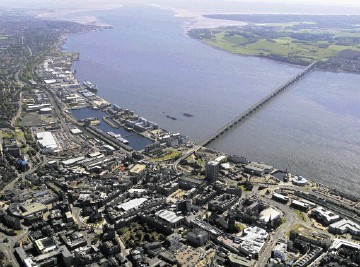
With its core industries of jute, jam and journalism, Dundee was one of the most globalized cities in the world in the early 20th century.
But when the last jute mill closed in 1998, the heady days of 1908 when the sector employed up to 50,000 people were a distant, faded memory.
Now, however, Scotland’s fourth-largest city is going through a renaissance.
Although it lost out in a bid to be named the UK’s City of Culture in 2017, it is pressing ahead with the establishment of the Victoria and Albert Museum, the centre piece of a £1billion regeneration of its waterfront.
Civic chiefs hope the museum will do for Dundee what the Guggenheim did for the Spanish city of Bilbao, which was visited by over one million people last year.
But Dundee has long been developing an industry of the future – video games.
A recent study found the number of computer games firms plying their trade in Scotland has rocketed sixfold in the last five years – with about a third of those based in the City of Discovery.
Richard Wilson, from TIGA, which represents the games industry, said Dundee had played a big role in the thriving sector, with more than 30 studios in the city.
“A lot of this is down to Abertay University being so successful in producing graduates for the industry, as well as start-up companies,” he said.
Chris van der Kuyl, a games industry veteran and chairman of 4J Studios, said the industry was “waxing not waning”.
He added: “Things are fantastic at the moment.”
“It is a technology industry and it is quite diverse. So some people are doing fantastically well and some people have their challenges, but that’s always going to be the way.”
Meanwhile, Dundee’s port owner Forth Ports has just pledged to make the largest single investment in the dock’s history.
The £10million is aimed at preparing the port to compete for a large slice of North Sea oil and gas decommissioning work and service Scotland’s offshore wind sector over the coming years.
Tim Allan, a property developer and president of Dundee and Angus Chamber of Commerce, believes that type of investment will drive much needed jobs into the area, which will help populate the city’s ambitious waterfront scheme.
He said: “The local economy is fragile and needs major employment through investment in large scale industry.
“Dundee has often fallen between the two stools of Aberdeen and the central belt.
“Now, the city needs co-ordinated action from local and national government to attract in more oil decommissioning work, to make long-awaited progress on renewable energy just off the Tay and innovative investment in the software-games sector which remains patchy despite its reputation.
“With a strong and comprehensive economic plan, to match the bold civil planning of Dundee, there can be long-term hope that sustainable business will be attracted to fill the spaces created.
“Without such a plan, then it’s is hard to see when they will come to what we have built.”
Mr van der Kuyl added: “I’ve got a strong belief that the industries that create their own intellectual property and their own value are the ones that will be long-term the most successful.
“Alongside digital media and games, life sciences and strongly intellectual-based industries are the way forward.”